They were trying to come home.
The men had crossed the border into Libya on a mission — to find work, to feed their families, to reconfigure the trajectory of life for their loved ones back in Egypt. They left behind mothers and fathers, brothers and sisters, wives and children — many of whom pleaded with them not to go. Too dangerous, they said. The men were all Christians, you see, and war-torn Libya was a growing stronghold of the Islamic State.
ISIS.
But there are precious few opportunities in the dusty, impoverished farming villages of Egypt’s Nile River Valley. So these sons and husbands made the long, perilous trek to the coastal Libyan city of Sirte, where they found jobs as carpenters and construction workers, hauling sand and rocks.
They all had their motivations: Gerges accepted the risk to help pay for his brother’s education. Essam worked to buy his family a small piece of land. Hani’s wife and their four children shared a house with his parents, five brothers and their families — he dreamed of an apartment of their own and a better school for their children.
By December 2014, the men were eager to return to Egypt. Essam called his father to say he would be home to celebrate Christmas.
“When he didn’t arrive,” says Essam’s father, “we began to worry.”
Captured
He was in the first group taken. It was late December, and Essam was on a bus bound for Egypt when gunmen from the Islamic State kidnapped him and six other men identified as Coptic Christians.
Another group of Egyptian believers remained in Libya, now afraid to attempt the journey home. According to Hani’s family, the bus driver told ISIS where the men were hiding.
“We’ve come for the Christians,” masked fighters announced when they showed up around 2 a.m. on Jan. 3.
This time they captured 13 men, beating and cursing and binding them all.
Their families heard about the abductions … then they heard nothing.
“The women didn’t eat or sleep,” says Hani’s wife. “We were just praying.”
The people of the Cross
The video shows 21 prisoners, all wearing the orange jumpsuits familiar to ISIS hostages. Behind each captive is a masked fighter dressed in black, blades at their chests.
The men are marched along what appears to be the shores of the Mediterranean Sea. Gentle waves behind them, the bound prisoners are pushed to their knees in somber synchronization. The caption below them:
“The people of the Cross, the followers of the hostile Egyptian Church.”
The group’s leader speaks in English, issuing threats against Rome and the West. The background music swells ominously. As if on cue, the captives are forced prone to the sand, knives to their throats.
Experts say much of the footage — the backgrounds, the sounds of the sea, even the relative size of the jihadists — was faked or manipulated. But the fate of the Egyptian Christians was not in doubt. All of them were martyred, brutally beheaded on camera.
In their final moments, their faith did not fail. There are reports that ISIS pressured the prisoners to renounce their Christian beliefs. Instead, as the blades pressed against their necks, the captives can be heard calling out to their Lord, Jesus Christ.
Even the 21st hostage, an African man not affiliated with the Egyptian prisoners, was given a chance to reject Christ. The man reportedly replied, “Their God is my God.” He was beheaded, too.
International response
Within days of the video’s release, members of Focus on the Family’s regional office in Cairo visited the small villages of the slain men. As the Focus Egypt team met with the martyrs’ families, they encountered not bitterness and calls for vengeance, but relief and rejoicing.
“I thank God that my son is in a place that I could never dream of,” Essam’s father says. “When I first heard of the murder … I blamed God. But now … I’m really happy for [Essam]. My heart aches, but I thank God.”
Sami Yacoub, regional director of Focus on the Family Middle East, says, “The martyrs and their families are simple people. Their Bible knowledge is limited. Still, their testimonies touched me more deeply than any sermons I’d heard before.”
Focus on the Family responded with an initiative to meet these families’ greatest physical need: safe and sturdy housing. Fundraising began in April 2015 and construction started in June. By January 2016, several new homes were completed and more than a dozen others repaired and upgraded.
“If you visited this village before and after the completion of the martyrs’ houses,” Sami says, “you would realize the renewal that Focus has brought to the whole community.”
Hani’s wife says both of her husband’s dreams have now come true: “With your help, we have our own apartment … and our kids in a good school.”


















